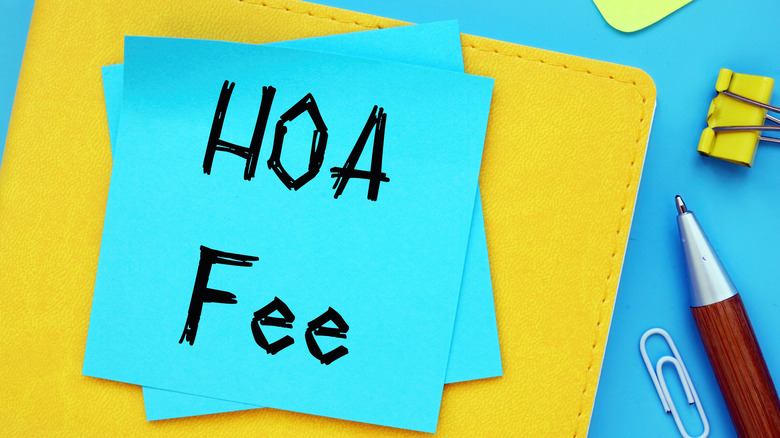The Reasons You Should Always Keep Up On Your HOA Payments
Every month, you write a check to the homeowners association (HOA) because you have to, but you wonder where those funds are going. Do you really need to make this payment, and what would happen if you just stopped doing so?
The HOA fee is an amount of money typically paid on a monthly basis to the homeowners association, the organization that creates and mandates rules for your community, according to Investopedia. The fees may be used to cover the cost of in-community amenities, like that swimming pool or clubhouse that you have access to but don't often use, and for community amenities, such as maintaining private driveways or handling repairs.
When you bought your home within the community, you promised to abide by the HOA rules and make payment on time every month to the association. However, there could be significant problems if you fail to make those remunerations that could end up costing you more in the long term.
You may lose access and face fines
The rules for nonpayment of HOA dues vary based on organization and location, with some states having more laws to support HOA collection activity. Often, the first step will be suspending your access to amenities, like that pool and other features and services provided by the association. If the HOA cuts your grass or provides snowplowing in your condo development, for example, you may no longer receive those services if you fail to make the monthly payments, according to Nolo.
Many organizations will also send letters and attempt to collect the debt in any way they legally can. There's a good reason they're pursuing the collection of those dues. In most cases, the HOA will not have the budget to maintain maintenance, repair, and other services within the community, which could mean the area loses value, Nolo explains. So making those payments not only helps to ensure you don't face fines and loss of access to amenities, but it could also maintain the value of the entire community.
You may get a lien on your home
There's another, more significant, risk that can happen if you fail to make payment on your dues. In many states, the HOA can place a lien on your home if you don't meet the requirements set under your contract, says Homeowners Protection Bureau (HPOB).
The lien on your property stays with you until you make payment in full, which could include late fees and other costs incurred by the HOA for placing the lien. This may not sound like that big of a problem until you try to sell your home or take out another mortgage on it, which could not happen until these costs are covered.
More so, the HOA can pursue foreclosure on your property, the legal process that forces the sale of your home to repay your debt, which in this case are your fees, Homeowners Protection Bureau (HPOB) notes. Laws in each state govern when and how the HOA can do this, but most often, they have the ability to pursue legal action to recoup those fees at your cost.


